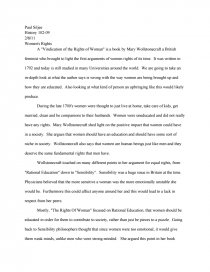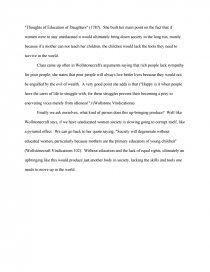Vindication of the Rights of Woman
Essay by nj234life • November 25, 2012 • Essay • 542 Words (3 Pages) • 1,767 Views
Paul Siljee
History 102-09
2/8/11
Women's Rights
A "Vindication of the Rights of Woman" is a book by Mary Wollstonecraft a British feminist who brought to light the first arguments of women rights of its time. It was written in 1792 and today is still studied in many Universities around the world. We are going to take an in-depth look at what the author says is wrong with the way women are being brought up and how they are educated. Also looking at what kind of person an upbringing like this would likely produce.
During the late 1700's women were thought to just live at home, take care of kids, get married, clean and be companions to their husbands. Women were uneducated and did not really have any rights. Mary Wollstonecraft shed light on the positive impact that women could have in a society. She argues that women should have an education and should have some sort of niche in society. Wollstonecraft also says that women are human beings just like men and they deserve the same fundamental rights that men have.
Wollstonecraft touched on many different points in her argument for equal rights, from "Rational Education" down to "Sensibility". Sensibility was a huge issue in Britain at the time. Physicians believed that the more sensitive a woman was the more emotionally unstable she would be. Furthermore this could affect anyone around her and this would lead to a lack in respect from her peers.
Mostly, "The Rights Of Woman" focused on Rational Education, that women should be educated in order for them to contribute to society, rather than just be pieces to a puzzle. Going back to Sensibility philosophers thought that since women were too emotional, it would give them weak minds, unlike men who were strong-minded. She argued this point in her book "Thoughts of Education of Daughters" (1787). She built her main point on the fact that if women were to stay uneducated it would ultimately bring down society in the long run, mostly because if a mother can not teach her children, the children would lack the tools they need to survive in the world.
Class came up often in Wollstonecraft's arguments saying that rich people lack sympathy for poor people; she states that poor people will always live better lives because they would not be engulfed by the evil of wealth. A very good point she adds is that ("Happy is it when people have the cares of life to struggle with; for these struggles prevent their becoming a prey to enervating vices merely from idleness!") (Wollstone Vindications).
Finally we ask ourselves, what kind of person does this up-bringing produce? Well like Wollstonecraft says, if we have uneducated women society is slowing going to corrupt itself, like a pyramid
...
...

